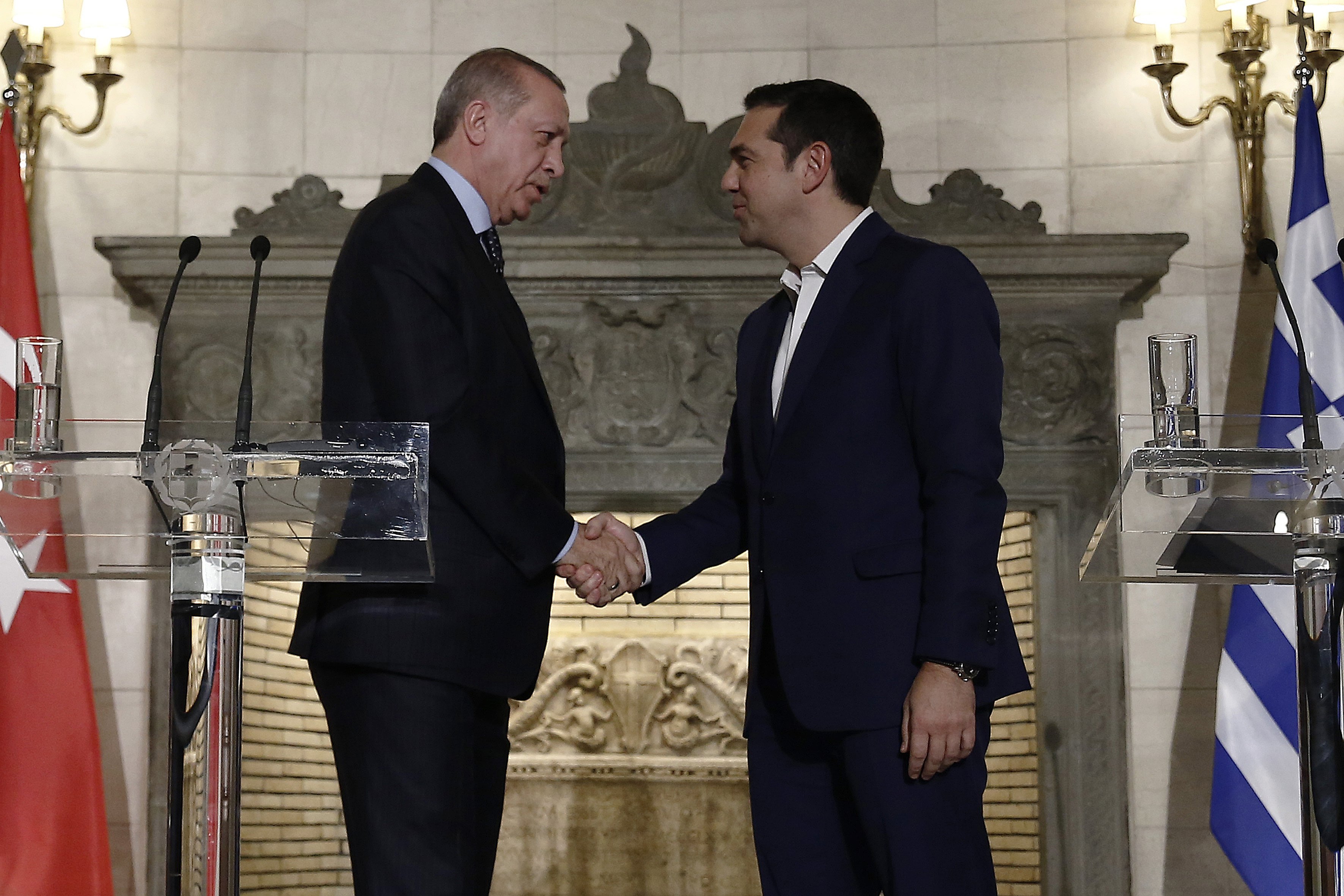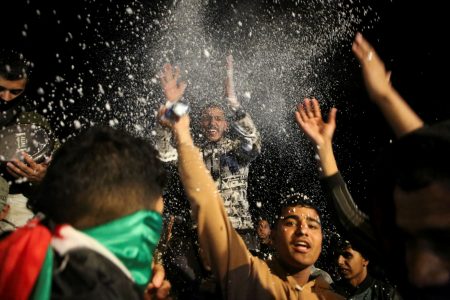The tug of war between visiting Turkish President Recep Tayyip Erdogan and his Greek government hosts over minority and religious freedom that began at Erdogan’s meeting with President Prokopis Pavlopoulos continued during his press conference this afternoon with Prime Minister Alexis Tsipras, and may well continue in tonight’s speeches at the state dinner at the presidential mansion.
As expected, Erdogan demanded that the Greek justice system extradite 10 military officers who fled to Greece after the July, 2016, coup against him.
Erdogan asserted that it safe to extradite the officers because Turkey has abolished capital punishment and does not implement torture. “I think the Greek justice system will hear this call for the extradition of the 10 officers,” he declared.
Greek judges, prosecutors blast Erdogan
The Association of Greek Judges and Prosecutors issued a blistering response to Erdogan’s attack on the Greek judiciary over the issue, which was launched in his interview with Greek Skai TV that aired last night.
“The Turkish President’s reference to a “disruption of respect for the Greek judiciary” and his observation that “the judicial system in Greece works up to a point”, regarding the non-extradition of eight Turkish officers who applied for asylum in Greece, oblige us to underline the following:
In our letter dated 2 February 2017 toward the European Association of Judges, we noted that with three decisions of our country’s Supreme Court delivered on 26 January, 2017, the court accepted that a possible extradition of the Turkish officers would place their lives in danger, and would expose them to torture and degradation, and with that rationale ruled against extradition,” the statement read.
“The Greek judiciary has exclusive authority to judge the extradition of citizens of third countries, and it does not base its judgment on the cordialities or denunciations of either Greek or foreign politicians.”
“In response to the remark of the President of the Republic of Turkey that, ‘The judicial system in Turkey is more just than any other European country”, we recall the continuous statements of protest of the International Association of Judges that regard the sacking of 4,000 judges and prosecutors in Turkey after 15 July, 2016, many of whom are held as prisoners in isolation cells, without any charges having been filed against them,” the Greek judges wrote.
Lausanne as battering ram for concessions in ThraceNoting the political maelstrom in Greece over Ankara’s revisionism regarding international treaties, Erdogan again depicted the Lausanne Treaty as outdated, but at the same time appeared to call for its full implementation regarding minority issues.
“We have a Muslim minority which may be of Turkish, Pomak, or Roma origins. We say that whereas the per capita income in Greece is 15,000 euros, in Thrace it is only 2,000-2,500 euros. There is an economic chasm. The head mufti is an appointed civil servant. The Lausanne Treaty said he should be elected,” Erdogan said, asserting that he had ought a revision of the Lausanne Treaty in talks with a series of prior Greek presidents and prime ministers.
Per capita income in Greece has been in a freefall for years, and indeed the Prefecture of Eastern Macedonia-Thrace is among the poorest in Europe (as are some other areas in Greece), and over half of the population is Orthodox Christian. But there are no data collected by the Hellenic Statistical Authority or the EU on the basis of religious affiliation, so it is at best unclear whence Erdogan derives his data.
Erdogan did, however, declare that Turkey does not wish to challenge the territorial integrity of any neighbouring country, a remark underlined by Tsipras as important, yet Ankara’s Aegean claims and the continuing Turkish occupation of nearly 40 percent of the territory of the Republic of Cyprus for decades have done just that.
Religious freedom ruse
Erdogan accused Greece of a lack of religious freedom, citing the delay in building an Athens mosque and blaming the Greek government for not operating the 17th century Fethiye Mosque in Monastiraki Square in central Athens.
There are very few Muslims of Turkish descent in Athens, but Ankara has tried to become the self-appointed protector of Muslims in the Balkans, and has for years slammed Greek government for not building an Athens Mosque.
Migration crisis blame game
The one thing that Erdogan and Tsipras agreed upon was the fact that their two countries have borne the brunt of the refugee and migrant crisis.
Erdogan said Turkey is host to three million refugees, with a 30 billion US dollar price tag, and that the EU broke a pledge for three billion plus three billion euros in aid. He said that the EU has spent only 850 million euros for support, and that all that went to the Red Crescent and not the burdened state budget.
According to the EU, the Facility for Refugees in Turkey, managing a total of 3 billion EUR for 2016 and 2017, “provides for a joint coordination mechanism, designed to ensure that the needs of refugees and host communities in Turkey are addressed in a comprehensive and coordinated manner”.
Denouncing Trump’s Jerusalem decision
Erdogan and Tsipras also concurred in their opposition to US President Donald Trump’s recognition yesterday of Jerusalem as the undivided capital of Israel.
Erdogan stressed that the US is the only country to recognise Jerusalem as the capital of Israel, and he asserted that the city is also the capital of the three major monotheistic religions.
Tsipras highlights contradictions on LausanneResponding to Erdogan’s demand for a sweeping revision of the Treaty of Lausanne, Tsipras stressed that the Turkish president’s position is not entirely clear and is in essence contradictory, as on the one hand he seeks to overhaul the treaty, and on the other he demands its faithful implementation on issues such as the popular election muftis in Thrace, which does not exist even in Turkey.
Stressing Erdogan’s clear statement that he is not challenging Greece’s territorial integrity – though his repeated frontal attacks on the status of Muslims in Thrace suggest that he may be pressing for regional autonomy in the long run – Tsipras asked rhetorically whether Ankara actually wants to revise the treaty or to ensure its implementation.
It should be noted that the Lausanne Treaty protected the rights of the Greek majority on the Turkish Aegean islands of Imvros and Tenedos, but systematic discrimination [organised expropriation of farmland for a pittance in the 1960’s, building an open prison on Imvros, etc.] emptied them of the Greek population.
Also, Ankara trampled on the treaty’s protection of the Greek citizens of Istanbul who had been established there for decades, the so called ‘etablis, thousands of whom were deported.
George Gilson



